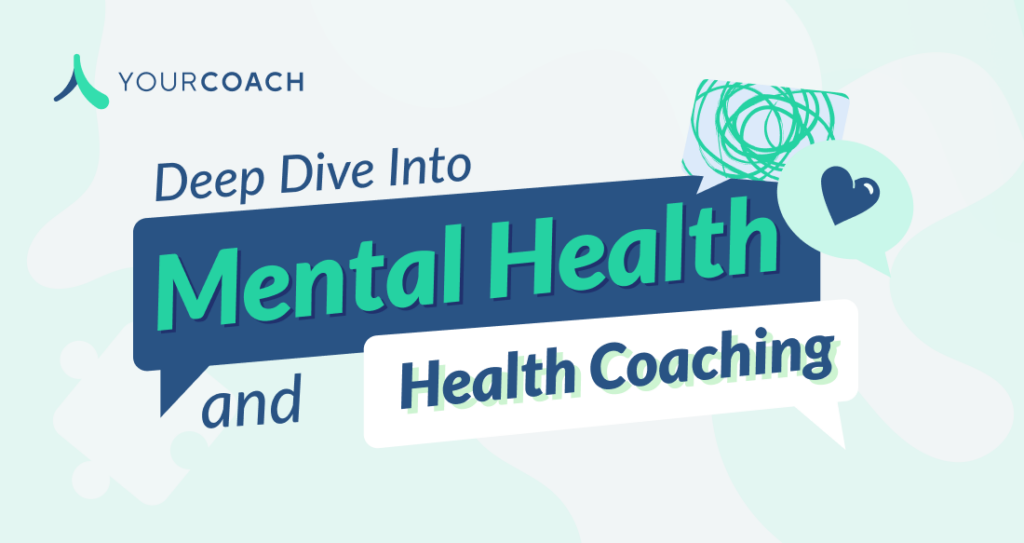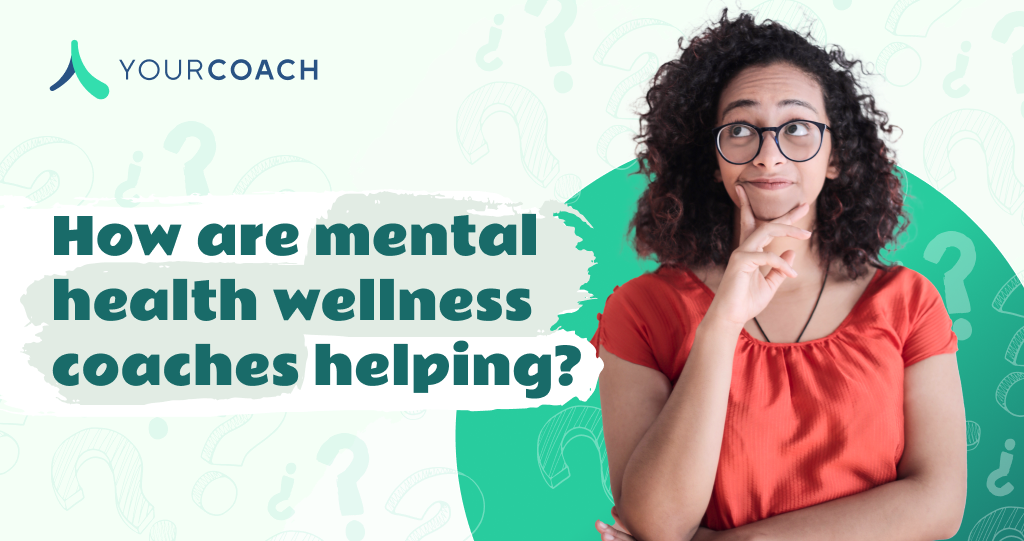
Mental health is continuing to be the focus across industries—within healthcare, corporate wellness, academia, digital health and more. And rightfully so. Mental health conditions are only becoming more widespread across the U.S., and access to necessary care has been slow to catch up.
Our mission at YourCoach is deeply rooted in improving access to mental health resources through health coaching, in our efforts to help create happier and healthier humans. Mental health is absolutely key to achieving optimal holistic health and we recognize that health coaches can be a massive gamechanger.
In honor of Mental Health Awareness Month, we’ve released our latest Deep Dive on the current state of mental health in the U.S. and the encouraging data around mental health coaching and mental health. Read on for a preview of what to expect from this incredibly important report.
What is mental health?
Mental health refers to a person’s emotional, psychological, and social well-being. It encompasses our thoughts, feelings, and behaviors, and influences how we cope with stress, make choices, and interact with others.
Mental health is a fundamental aspect of overall health and wellbeing and plays a crucial role in every stage of life, from childhood and adolescence through adulthood.
The WHO states that mental health is “more than just the absence of mental disorders or disabilities”. Caring about mental health is not only about managing current and ongoing conditions but also looking at long-term wellness and happiness.
What might contribute to mental health conditions?
- Biological Factors – Biological factors include genetics, brain chemistry, and hormonal imbalances. For example, a family history of certain mental health conditions can increase the risk of developing similar conditions. For example, estimates suggest that genetic factors may increase the risk of schizophrenia by up to 80%. Separately, imbalances in neurotransmitters, which are responsible for generating signals in the brain, can contribute to or be correlated with the development of mental health issues.
- Access to Care – As of today, more than half (54.7%) of adults with mental illness in the U.S. do not have access to the mental health treatment they need. Adequate access to affordable and quality mental health services, including therapy, medication, and support programs, is essential for early intervention, diagnosis, and effective treatment.
- Environmental Factors – Early life experiences, such as childhood trauma or abuse, can have long-lasting effects on mental health. Other environmental factors like chronic stress, exposure to violence, socioeconomic status, and access to healthcare and social support can also impact mental well-being.
- Psychological Factors – Psychological factors and mental health are deeply symbiotic. Negative thought patterns, low self-esteem, excessive self-criticism, and poor coping skills can increase vulnerability to mental health conditions. Conversely, having good emotional regulation, resilience, and healthy coping mechanisms can contribute to positive mental health.
- Social Factors – Supportive relationships, a sense of belonging, and positive social connections can promote mental well-being. On the other hand, social isolation, discrimination, stigma, and lack of social support can negatively affect mental health.
- Lifestyle Factors – Regular exercise, a balanced diet, sufficient sleep, and stress management practices can positively affect mental well-being. Poor nutrition, lack of physical activity, and excessive alcohol consumption can contribute to mental health problems. Long-term substance abuse, in particular, has been linked to anxiety,depression, and paranoia.
Why is mental health so important?

Mental health conditions are steadily on the rise in the U.S. and though we’ve expanded treatments in the last decade, we still have plenty of work to do. Every year, nearly one in five adults and one in six children in the U.S. experiences a mental illness.
Data shows that the prevalence of mental illness is higher among young adults aged 18-25 years and among adults reporting two or more races. In terms of gender, females report mental health symptoms more frequently than males. Studies found that women are twice as likely to suffer from anxiety and almost 2 times more likely to suffer from depression than men.
These staggering numbers are only compounded by the fact that more than half of American adults suffering from a mental illness do not receive the treatment they need.
Untreated mental health conditions can have serious implications. They might have an impact on physical health conditions—like diabetes and heart disease—as well as the ways in which we show up at school, work, our relationships and the ways we cope with uncertainty, sadness, pain and more. Mental health is one of the single biggest predictors of overall health and wellbeing and when we fail to focus on this critical aspect of our lives we may face serious and lasting consequences.
How are mental health wellness coaches helping?

The effects of health coaching on mental health are undeniable. Studies suggest mental health coaches can have significant and lasting impacts on mental health conditions across the board.
Health Coaching Studies
For example, a recent study on nearly 1,500 participants in the US suffering from moderate levels of anxiety and depression showed a marked decrease in symptoms when working with a mental health coach. Similarly, a 2021 study examining the impact of the VA Whole Health Coaching program, that was focused on providing mental health for the military showed significant improvements over baseline in mental health, stress, and perceived health competence. We’ve compiled a sampling of some of the strongest current data in our latest Deep Dive to help showcase this impact a bit more.
Health coaches play a unique role in patient care teams and it’s important to note their non-clinical role is distinct and uniquely valuable compared to mental health practitioners like psychotherapists.
What does a mental health coach do?

Education & Awareness
Mental health coaches can point clients to educational tools and resources to help clients understand their condition, symptoms, and how lifestyle factors might affect both. What’s more, they can recognize when to recommend clients seek out care or advice from their healthcare team and encourage them to do so.
Lifestyle Modifications
Mental health coaches can help clients pursue healthy habits that improve ongoing conditions or cultivate habits that make it easier to take required medications more regularly.
Stress Management Techniques
Mental health coaches can help clients incorporate tools to better manage potentially triggering situations as they arise.
Emotional Health & Wellbeing
Mental health coaches serve as a strong support system for clients as they manage the day-to-day of ongoing mental health conditions.
Goal Setting
Health coaches can work with clients to set realistic and achievable goals related to their mental health. Coaches can help clients break down these goals into actionable steps and provide guidance on how to implement and sustain positive changes.
Referral and Collaboration
If a client’s mental health condition requires additional support, a health coach can refer the client to mental health professionals such as therapists, psychiatrists, or counselor to ensure comprehensive and coordinated care for the client.
What is YourCoach doing to expand access to mental health coaching?
Our team is passionate about improving mental health through health coaching, beyond just Mental Health Awareness Month. Our mission boils down to just that, helping create happier and healthier humans through health coaching. We’re all about authenticity at YourCoach, so it’s not just enough to state our mission—we’ve majorly proven how committed we are to this goal in the past year. More than a quarter of health coaches on our platform have identified mental health coaching as a core focus of their practice.
What’s more, we’re the first in the industry to pioneer industry partnerships with digital therapeutics companies that are innovating to provide better mental health resources, tools and care. We’ve helped them surround their existing offerings with health coaching, while leveraging validated coaches from our platform to power up these endeavors. We’re already seeing impressive results and are looking forward to sharing some of these anonymized results in the near future. Part of this include supporting better mental health in the workplace, supporting employee health at work, which is achieved through the support of contracted, mental health coaches via the YourCoach platform.
It was important for us to join the conversation during Mental Health Awareness Month to make sure the power of health coaching was communicated and celebrated more broadly. We brought this to life through a CEU-eligible event on Mental Health & Care earlier this month and now through our latest Deep Dive. However, we’re committed to educating about the impact of health coaching on mental health and expanding access all year long. It’s a cornerstone to the Health Coaching Revolution and we have lots more in store to further this mission in the years ahead.


